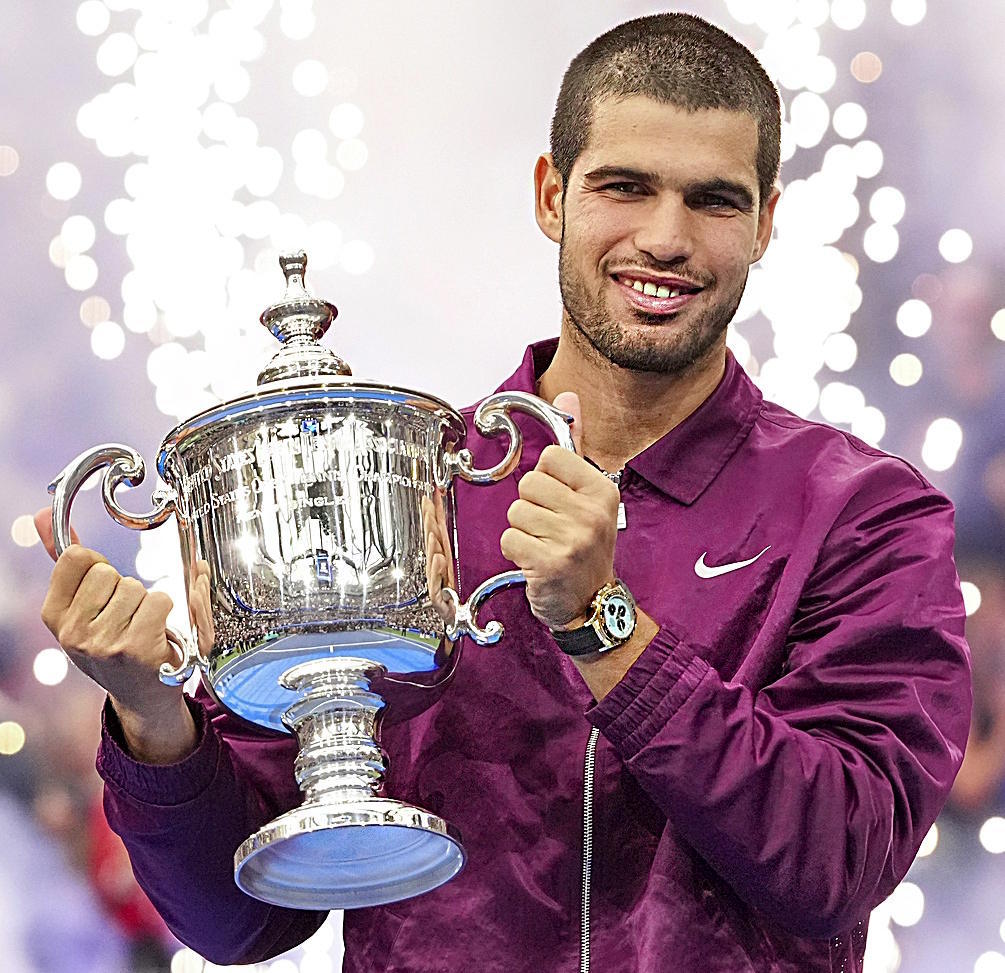Victories feed on defeats, proclaimed Carlos Alcaraz with his precise tennis, the best of his life. The recent frustration at Wimbledon, where he lamented his shortcomings, led him to a superlative version of himself and to the most resounding success against his historic rival, Jannik Sinner. He had defeated him before - up to nine times - but almost always with uncertainty. This Sunday, in the US Open final, he defeated him in two hours and 42 minutes of play as if another result were impossible.
"There is something in his game that makes you think of a large airplane starting its descent to land at JFK in New York," John McPhee recounted in The Levels of the Game while watching Arthur Ashe here, and the same could have been written about Alcaraz. At 22, his sixth Grand Slam keeps him in line with legends - he already has the same number as Boris Becker or Stefan Edberg, Rafa Nadal at his age had one less - it returns him to the number one spot in the ATP rankings, and, above all, it places him ahead in the rivalry that will mark tennis.
It will be like this. Until when? Who knows. But it will be like this. They have been at it for a couple of years and it could be a couple of decades. Two men. Two tennis players. A continuous discussion for supremacy in their field. If the comeback at Roland Garros ignited the fire in Sinner, the misfortune at Wimbledon definitively transformed Alcaraz. The rematch required improvement, change, evolution.
Nothing remains of that teenager who feared nothing - "Maybe the dark," he would answer if asked about his fears - now he is a resolute man. Off the court, he has modified his routines, and on the court, he has perfected his game. He maintains that unpredictability in every shot, but no longer walks between two buildings without harnesses. To make him fail, you have to make him fail. You have to fight hard to make him fail. In the first set, he only made two unforced errors, the same as in the third, while pushing Sinner to stumble time and time again. The lesson was learned: there could not be one shot like another. His exchanges were dressed with a huge variety of effects, speeds, heights, angles. He slowed down the ball, then sent it to the side and then slammed it deep. It was the formula for revenge.
And Alcaraz did not let a second pass to apply it. In athletics, the judges would have called a false start. Much of the audience had not even sat down yet - security measures due to the arrival of the President of the United States, Donald Trump, delayed the match by half an hour - and he was already dominating Sinner. In fact, his first set was perfect. More focused from the start, his presentation was brilliant, with moments of delirium. One of his trademark drop shots, on the run, lunging at the net, got everyone on their feet. The match would have lasted an hour and a half against any other opponent. But Sinner was Sinner.
The Italian had many arguments, and these prevailed in the second set when Alcaraz loosened up. The question then remained: can he recover? There were a few minutes where he complained to his team as he had done at Wimbledon. But they were few. Again, evolution. Shielded by his serve, precise and fast throughout the US Open, he regained composure and launched himself at his historic rival to execute his revenge. In the fourth set, with two match points lost by the Spaniard, memories of Paris came flooding back, but on the third attempt, he was relentless.
September 7th. 5:29 PM on the clocks in New York. The date and time chosen by Alcaraz for payback. No matter what. In whatever circumstances. Tennis for a Spaniard is the sun, it is only played if there is natural light, let alone playing in the rain. It is not the same in northern Italy, where most of the year they take refuge in those huge hangars with inflatable covers. That defines the character of Alcaraz and Sinner, the joy of one, the serenity of the other, but above all, it defines their shots. The rain over New York imposed a roof on the final, theoretically disadvantaging the Spaniard, who enjoys the ball bouncing higher thanks to the heat.
In his resume, there is only one minor title in those conditions, a minor one at that, Rotterdam, while Sinner had already dominated entire tours indoors. But it didn't matter. "Under a roof, it will be played under a roof," confirmed the Spanish team during the warm-up at Arthur Ashe many hours before, and there was no trace of regret. If they have to play like that, they will play like that. If they have to win like that, they will win.
